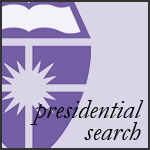St. Thomas has had 14 presidents in its 127-year history, all priests, all men. Thanks to a 2011 bylaw change, the university’s 15th president could now be a layperson and also a woman.
Despite the long tradition of priest presidents, Susan Alexander, executive adviser to the president, said she thinks that the St. Thomas community would welcome a woman at its helm.
“I think people always think they’re not ready for a change, and then, when that change comes and it’s a good opportunity for us, we just embrace it,” Alexander said. 
In the last two academic years, 35 Association of Catholic Colleges and University member institutions have hired new presidents, and for 11 of them, women have taken the lead role.
Of these 11 institutions, just three of them succeeded male presidents. Only one was the first female president, and none of them succeeded a priest.
Even though St. Thomas would be the first in the ACCU’s recent history to have a woman succeed a priest in the president’s role, Alexander still said she thinks the possibilities are good.
“The search committee is quite open to this possibility, and if you’re looking at the potential pool of candidates … in the U.S. for example, there are many women who are college presidents that might be interested in moving into such a role at St. Thomas,” Alexander said.
Junior Jake McEwing said he thinks a woman would do just as well as a man would as president of St. Thomas.
“I think their ideals would be different than a priest’s ideals, but not different than a man’s ideals,” McEwing said. “I think it would be a cool thing to have a woman.”
Junior Hilary Cotter said she doesn’t think gender will be a deciding factor for the next president.
“It will be someone who upholds the traditions of the university, so I don’t know that gender would really make a difference as long as their values were the same as the university’s,” Cotter said.
Cotter also said a layperson or a woman would better reflect a changing university.
“I think that might more accurately represent the interests of the students because a majority of the students aren’t going to be priests,” Cotter said. “They took the bylaw out for a reason … they were thinking about that possibility.”
The Leadership Profile prepared by St. Thomas’ search firm Witt/Kieffer explains the motivation for the change that allows for non-priest candidates.
“The bylaws change was intended to ensure the university has the strongest possible president,” the leadership profile reads.
Senior Martin Sicam said he thinks that even though the university could choose a woman, choosing a priest is still the best option to preserve Catholic faith and Catholic tradition.
“It says that we’re serious about the faith, which is supposed to be one of our main messages,” Sicam said.
Alexander said the Rev. Dennis Dease’s long and popular tenure as president will challenge any future president of the university, regardless of gender.
“I think anyone is going to face the problem of ‘you’re not Father Dease,’” Alexander said.
Alexander said she thinks that as long as the next president is “well-qualified, a good leader, a good manager, and far-sighted in higher education,” he or she will eventually win over the St. Thomas community.
“Once that happens, I think we’ll be happy. We’re hoping that happens with whoever we pick: man, woman, layperson or religious,” Alexander said.
Heidi Enninga can be reached at enni5264@stthomas.edu.


The question here is not whether a change might be good, or whether a lay person, male or female, can do a good job as president of UST. The question that arises is regarding the history and tradition of the school itself. The property that UST occupies was donated to the diocese with the intention that it be used for an institution of higher learning, and that, unlike most other such schools, it be owned and operated by the diocese. The people of this diocese are the ones who have donated much to the building and support of UST. Since its beginning, that has meant that the school has been under the direction of the Archbishop of the diocese with him sitting as the Chair of the Board of Trustees and with a priest of the diocese being the president. That has insured, at least to this point, that the school has retained its true Catholic identity, unlike many of the others. The current Board of Trustees have changed this history and tradition by denying this Archbishop his rightful and traditional position as head of the Board and now seek to place someone other than a priest of the diocese as president. Many other schools have taken this step, St. Johns being the most recent, and have lost their Catholic identy in the process. This should not happen to UST.
I believe that the University of St. Thomas is the property of the Diocese of St. Paul and Minneapolis and belongs to the people of the diocese who sacrificed much to build it. It is a matter of principle here that in my opinion, the Board of Trustees has no right or power to change. The ones who will lose out will be those who sacrificed to build it and the students who attend, especially if the traditional Catholic identy is lost and the school, like many others, becomes more secular. With the diocese in control and a priest as the president, the Catholicity of the school is more assured.